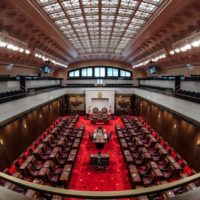News
Government Representative in the Senate proposes schedule for votes on 11 bills
Senator Peter Harder gave notice of his programming motion in the Senate on Tuesday.
The Government Representative in the Senate has signaled his intention to set a schedule for debate and final votes on Government legislation before Parliament rises for the summer.
Senator Peter Harder gave notice of his programming motion in the Senate on Tuesday, laying out timelines for 11 Government bills that have been before the Senate for up to 15 months.
Sen. Harder said his proposed timeline will give Senators from all sides of the chamber ample time to debate and study the legislation, and to move amendments for consideration.
He also warned that many bills are moving too slowly through the upper chamber. For example, Bill C-55, which helps protect vulnerable marine areas in Canada, has been in the Senate since April 2018. He noted that the first Conservative to speak to the bill waited until November 8, 2018 to do so, despite being able to speak on virtually any sitting day.
Bill C-57, legislation to establish sustainable development strategies for federal departments and agencies, was recently obstructed by Conservative Senators for nearly 8 hours, by moving procedural motions. During this time, the Senate was not able to debate or vote on any legislation. Bill C-57 passed the House of Commons unanimously.
A programming motion was most recently used in the Senate during the debate and final vote on Bill C-45, legislation to legalize and regulate cannabis.
“Given past practice and ongoing delay, we just can’t be sure that the Opposition wants to give these bills fair and timely consideration,” he said.
“Canadians expect Senators to respect public business, and to do their work in both a thorough and diligent fashion. This motion will also allow Canadians to better follow and contribute to the Senate’s work, with organized debates and votes.”
The motion proposes that:
- Bill C-48, which formalizes a heavy oil tanker ban on Canada’s north Pacific coast, must have a final vote by June 6. Further, the Standing Senate Committee on Transport and Communications, must report back to the Senate for third reading by May 9. The bill has been before the Senate since May 2018.
- Bill C-55, which helps protect vulnerable marine areas in Canada, must have a final vote by April 11. Further, the Standing Senate Committee on Fisheries and Oceans must report back to the Senate for third reading by April 5. The bill has been before the Senate since April 2018.
- Bill C-58, which updates Canada’s access-to-information laws, must have a final vote by April 11. Further, the Standing Senate Committee on Legal and Constitutional Affairs Legislation, must report back to the Senate for third reading by April 5. The bill has been before the Senate since December 2017.
- Bill C-59, which enhances Canada’s national security, must have a final vote by May 30. Further, the Standing Senate Committee on National Security and Defence, must report back to the Senate for third reading by May 16. The bill has been before the Senate since June 2018.
- Bill C-68, which restores protections for Canada’s freshwater and marine fisheries, must have a final vote by May 30. Further, the Standing Senate Committee on Fisheries and Oceans must report back to the Senate for third reading by May 7. This bill has been before the Senate since June 2018.
- Bill C-69, which improves the rules for the assessment of major projects, must have a final vote by May 30. Further, the Standing Senate Committee on Energy, the Environment and Natural Resources, must report back to the Senate for third reading by May 9. This bill has been before the Senate since June 2018.
- Bill C-71, which aims to prevent and reduce gun violence, must have a final vote by May 9. Further, the Standing Senate Committee on National Security and Defence, must report back to the Senate for third reading by April 10. The bill has been before the Senate since September 2018.
- Bill C-75, which aims to reduce delays in criminal proceedings and eliminate peremptory jury charges, must have second reading vote by April 4 and a final vote by May 16. Further, the Senate committee tasked with studying the bill must report back to the Senate for third reading by May 10. This bill has been before the Senate since December 2018.
- Bill C-78, which changes federal family laws, must have a second reading vote by April 11, and a final vote by May 16. Further, the Senate committee tasked with studying the bill, must report back to the Senate for third reading by May 14. This bill has been before the Senate since February 2019.
- Bill C-81, which aims to enhance the full and equal participation of all persons, especially persons with disabilities, in society, must have a final vote by May 16. Further, the Standing Senate Committee on Social Affairs, Science and Technology, must report back to the Senate for third reading by May 7. This bill has been before the Senate since December 2018.
- Bill C-85, which makes legislative changes required to ratify the modernized Canada-Israel Free Trade Agreement, must have a second reading vote by April 4 and final vote by May 9. Further, the Senate committee tasked with studying the bill, must report back to the Senate for third reading by April 30. This bill has been before the Senate since February 2019.




















































